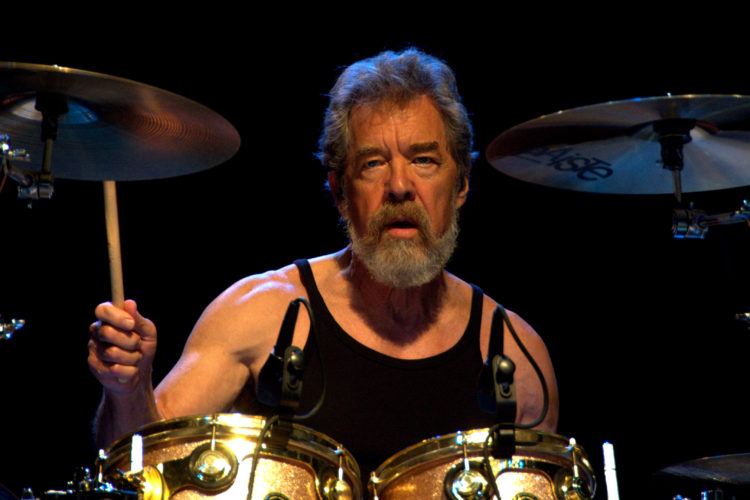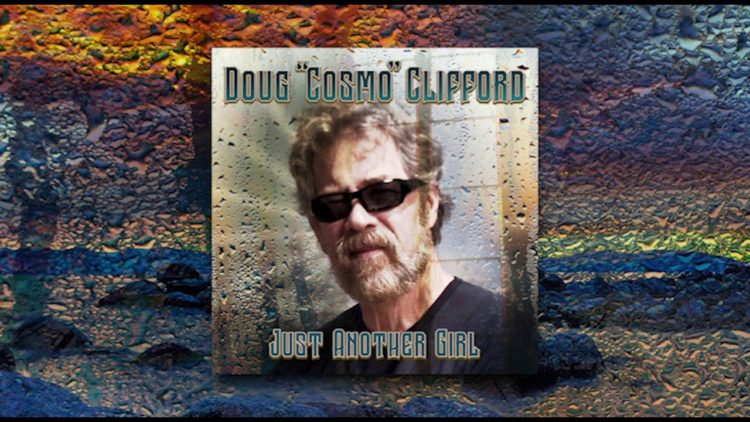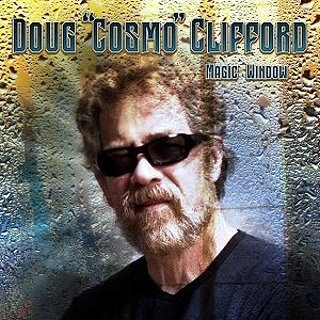
Sometimes it’s good to do a little cleaning up around the home or garage. You never know what you might find. Reading like something out of a Discovery Channel reality show about lost treasure, veteran drummer/songwriter Doug Clifford has a tale to tell, one of finding something forgotten through the mists of time, but which was found again, to the delight of him, and his legions of fans.
A couple of years ago, the co-founder of legendary American rock band Creedence Clearwater Revival (CCR) discovered long lost master recording tapes of solo material he was working on in the 1980s, more than a decade after the break-up of the band. Not able to secure a record deal with it at the time, the tapes were put away in’s storage at Clifford’s Lake Tahoe, Nevada mountain home. Out of sight, out of mind, right?
Well, once discovered it turned out the music contained therein was of excellent quality, as was the quality of the recordings themselves. So, taking one of the most complete of the lost reels, adding a tiny but of digital modernization and remastering, Clifford recently released this formerly lost material as a solo album under the moniker Magic Window independently on all streaming and download platforms as well as though CD Baby.
Here’s the story right from Clifford’s own recollection of the ‘miracle’ of the recovered, once lost and forgotten albums.
“I was up in my studio going through some files looking for something and I opened one of the drawers that I very seldom used and saw a reel to reel tape in a box and it looked like a master reel, which it ended up being. I remembered that at one point I had a bunch of these things around somewhere and wondered if I could find them and if there was anything usable on them. I went downstairs to where I would store that stuff in the garage, in some lockers there. I had one area where I would just put musical stuff which, again I hardly ever opened. When I opened it, there was a box full of those reels, about 10 of them. Not all of them were marked, but by reading what was on some of them, I saw they were about 35 years old,” he said.
“I wanted to listen to them, but I knew I couldn’t just put them on a machine, because they would probably disintegrate. I called an engineer friend of mine at the University of Nevada and he said they could bake them, which would bond the tape enough to get a play through at least. From there it can be digitized and then I would have it forever. I did that, and all of them turned out to be perfect. There wasn’t a bad one in the bunch. So, now I’ve got a lot of other projects and would-be albums coming from this treasure trove that I found in the garage. There are about a dozen reels in all, including a couple I had upstairs, and I believe there’s between six and 10 albums’ worth of material.
“These were all songs that I wrote or co-wrote, and at the time I wanted to have really good quality demos, so I did master quality sides for that, and I am glad I did, because it’s allowed me to have this album out right now. Like I said, they were demos, but they were of high quality because I did them in my own studio, using top musicians. The songs for this album, Magic Window, were ready to go. I did a little ProTools work on it and added a rhythm guitar track and because this was a two-track master, not multitrack, we were limited in what we could do. Then we had it mastered by the great George Horn, who has been doing it for about 50 years and is an old friend. And it turned out really terrific. We are all really excited about it.”
It marks the first time that listeners can also hear Clifford’s voice loud and clear. He did a few background vocals back in the CCR days, but rarely did them live. He does admit that this was the aspect of making solo music that gave him the most pause for thought.

“People aren’t expecting the quality of the project or my performances. I did have one solo album that came out in late 1972 [called Cosmo, his nickname] but it was really an experiment to see if a live recording truck could work at our rehearsal space, Cosmo’s Factory so we could convert it into a studio and not just a practice facility. I didn’t do it to try to be an artist. But with this material, by the 1980s I was trying to be an artist. And as regards to my singing, I worked really hard at it. So, when people hear it now, they are really surprised. People hearing it now are saying, ‘wow I didn’t know it was going to be like this.’ And I said, ‘well, I didn’t know it either. I hadn’t seen it or heard it in 35 years,’” Clifford said.
“During the heyday of Creedence, we had a pretty good singer [John Fogerty] in the band and he wasn’t really letting anyone else sing. He wouldn’t even let his brother Tom sing. When we were a trio [before Tom Fogerty joined in 1967] I did some backgrounds, but I don’t like singing from behind a drum set. Back in those days I moved around a lot as a drummer and I used to break a lot of things. I liked moving around and I hated being stuck on that microphone. It sort of inhibited my playing and what I was doing as a drummer, so I didn’t sing much.
“And I always liked to sing, but in the shower more often than not. But I remember really preparing for this record and worked on the vocals more than anything else. I knew I had the drumming pretty much down, but the singing part was very important – it’s kind of the key factor in all of this. And then I also had some amazing co-writers. I would only write with one person at a time, because I don’t like writing by committee. There are also three songs on the album that I wrote by myself, with just me at the piano.”
Magic Window features Russell DaShiell on guitar, with DaShiell also acting as producer for those 1986 sessions. Bass is performed by Chris Solberg [Santana], with other guitar work, and some co-writing, coming from Rob Polomsky. Clifford, of course, handled all drums and percussion as well as lead vocals.
The title track refers to a real window in the home he was living in on Lake Tahoe in Nevada at the time the songs were originally composed and recorded in the mid-1980s, a source of both contemplation and inspiration for Clifford.
“It’s the big window in the studio of my old house. I had a four-story house before they brought in height restrictions, so we built a big house, over 7,000 square feet, with 1,000 square feet of that my studio on the top floor, which is where we did the work. I had a 16-track setup there with a classic Trident board. It was really good quality recording equipment and that made it helpful too because we didn’t have to worry about somebody coming into for the next appointment in a hired studio. It was my studio and we could keep the levels on the board where we wanted and we could be in there as long as we wanted, any time we wanted, which took a lot of pressure off from the recording side of it in those days,” he said.
“Magic Window is about something that was actual and real, but the other part of that song is that the magic window is in your imagination, and anything can come from it. The magic window that’s real is the magical scene when you look out the actual window and see the surrounding countryside and the lake itself. Looking out, you’re 1,000 feet above the lake, and had a 360-degree view. Not many people have that view, with the ability to look out and see this beautiful 23-mile long lake surrounded by mountains. I would often go up there and looking out that window really helped me get sort of focused and centred on my writing. If I was struggling, I could go up to the studio and look out the magic window and get my head right.”
There are a number of songs about various aspects of love on Magic Window – true love, romantic love, the pursuit of love, unrequited love and lost love. Clifford said it was a natural subject matter to write about, as it is with most songwriters and poets, but made a point of noting this was a departure from his former band.
 “Well, Creedence never did a love song. So, I had a lot of ground to catch up on. Love songs are generally very popular. It’s a subject where, if you go down the list of hit records over the last 10 or 20 years, probably the majority of them would be about love in one form or another. That’s always a good subject, and its positive for the most part,” he said.
“Well, Creedence never did a love song. So, I had a lot of ground to catch up on. Love songs are generally very popular. It’s a subject where, if you go down the list of hit records over the last 10 or 20 years, probably the majority of them would be about love in one form or another. That’s always a good subject, and its positive for the most part,” he said.
“There is one song on the album where there is a broken love, heartache and pain. It’s a story about people who don’t keep the romance going by telling the other person how much they mean to them, that’s the song You Mean So Much to Me. If you’re in a relationship, even though it was strong, it has to continue to grow and get stronger and you can’t forget and get lazy and stop saying the important things. You need to be observant that you’ve got someone special and you’d better let them know that you love them – and let them know it often.”
Another love-related story is the first single from the album, entitled Just Another Girl, an atypical example of the ‘boy meets girl’ phenomena, according to Clifford.
“Robbie [Polomsky] and I were throwing some ideas back and forth and I told him I wanted a song that wasn’t a typical love-at-first-sight story. Usually its, you know, ‘I saw her, and I fell to my knees and begged her to be with me,’ or whatever. I wanted a different angle, I wanted something that was more realistic and not like a fairy tale or something from a cheesy romance novel,” he said.
“The song starts off, ‘the first time I saw you, you were just another girl.’ He didn’t recognize it for whatever reason. ‘How was I to know then that you were going to change my whole world,’ he says later. It really is a different angle on that normal love song. Yes, it still has a happy ending, but I wanted to start out with something people weren’t expecting to hear, but I bet that lots could identify with.”
The songs on Magic Window were intended for a solo album that Clifford hoped to put out, sometime around 1986 or 1987, when they were recorded. The recordings on the master reel were used as an introduction to various record labels. At one point, he was almost signed, but the deal fell through when the label owner suffered a mental breakdown. Other attempts at getting signed were fruitless, so Clifford tucked the tapes away and started working on other endeavours, including eventually reuniting with CCR bassist Stu Cook to form Creedence Clearwater Revisited in 1995.
There is a sense that, even with all the success Clifford achieved as part of CCR, including millions of records (both LPs and 45s) sold, regular airplay still on terrestrial radio, and induction into the Rock and Roll Hall of Fame in 1993, that he wants to create a more personal legacy for himself, to have music that is billed under his own name, that is of his own creation, with not only his drumming heard, but also his literal and lyrical voice.
“I am using Magic Window to pave the way for all the other songs and albums that I have in the can. I am looking for a hit of some kind. I am trying to get on the charts. I would love to chart with this, because once you do that, what you are having coming up next gets a lot more scrutiny and attention, and you’ve got a much better chance of getting that played. And I know I’ve got more great music: the songs are good, the performances are good, it’s like I’ve got a small little record company catalogue in the can. They may need to go through the mastering process again before I’d put them out, but that’s standard procedure anyways,” he said.
“The dream we had when we started Creedence, and it wasn’t even called Creedence Clearwater Revival at the time, and it was just John, Stu and I, and we were an instrumental trio. What we wanted was someday to have our songs played on the radio. Well, here it is 52 years later from the release of our first single, and they’re still playing our songs on the radio. So, that dream came true, and so many others have also come true, which is why I still believe in dreams.
“But at the same time, you can dream your life away. You have to be passionate about it and you have to work hard at it, and that’s what we did. It took us ten years back then before we had that first hit. We worked very hard together until it was right. I am working on a new dream right now, and I’m going to put everything I’ve got into it and hope that it comes true. Part of it, is people don’t expect it from me. I am not just a drummer. Being just a drummer in Creedence Clearwater Revival is a pretty big deal, I mean, it’s pretty cool and I am proud of it and thrilled and honoured and humbled by it. But this is the whole enchilada here. I am the artist, the writer, the producer, the singer – that’s what I am hoping to accomplish is to be recognized for that as well.”
Up until the start of 2020, many fans continued to see Clifford and Cook playing as part of Creedence Clearwater Revisited, which is also recording albums of original material, as well as playing CCR classics. The band was a staple out the touring scene from its formation in 1995 but was put to bed in January after a quarter of a century, partially to allow Clifford to concentrate on revitalizing all of these old tapes.
“We’re done. We wrapped it up right at the end of last year. We had talked about it for a few years and had been cutting back on the number of shows. Our lives are changing. We both just had our 75th birthdays and the travel was becoming real tough. I have some problems with my back, and I’ve got Parkinson’s and a few other things. It’s been 25 years. We had a five-year plan at the start, so we think that 25 years is a good time to say sayonara and that’s what we did,” he said.
“Now without all that touring, I have a lot more time to spend on family and friends and other things I want to do. I have a regular schedule, which is weird for me being a musician all my life and career. So, yeah, it’s nice to not be travelling. I’ve got five grandkids and I’ve missed a lot of birthdays and things like that. And you also have to realize that we started Creedence when we were 13 years old, John, Stu and I, and it took us 10 years to have our first hit. So that’s 62 years as a musician. Revisited had wonderful times, right up until we stopped, we were still growing our fan base. We have had three generations and lately I started seeing a fourth at our shows, the single digiters I call then, kids who are like, seven or eight years old. I am confident that the music will be around a lot longer than I will, that’s for sure.”
For more information on Magic Window and future releases and other information about Doug Clifford, visit https://dougcosmoclifford.com.
- Jim Barber is a veteran award-winning journalist and author based in Napanee, ON, who has been writing about music and musicians for 30 years. Besides his journalistic endeavours, he now works as a communications and marketing specialist. Contact him at jimbarberwritingservices@gmail.com.
SHARE THIS POST:
